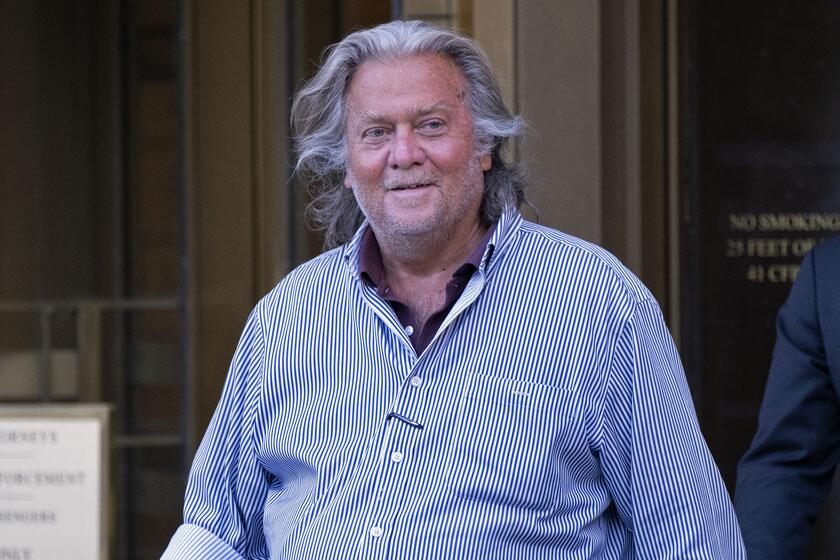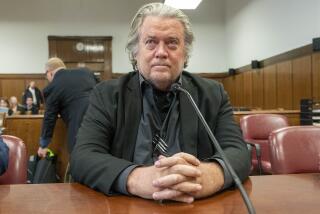Trump ally Stephen Bannon indicted on contempt charges over Capitol riot inquiry
- Share via
WASHINGTON — Former Trump advisor Stephen K. Bannon was indicted Friday by a federal grand jury after failing to cooperate with a House committee investigating the Jan. 6 riot at the U.S. Capitol, a move that ratchets up the pressure on others to testify about the deadly insurrection.
Bannon, 67, was charged with two counts of contempt of Congress after he refused to appear for a deposition or hand over documents to the special House committee investigating the Capitol attack. Atty. Gen. Merrick Garland said in a statement that the indictment shows his department has a “steadfast commitment” to pursuing justice in such instances.
A firebrand political operative who helped run Donald Trump’s 2016 campaign and later worked in the White House, Bannon faces a maximum of a year in jail and $1,000 fine for each count. Robert Costello, an attorney for Bannon, did not respond to an email seeking comment.
Leaders of the special House panel said the indictment sends “a clear message to anyone who thinks they can ignore the select committee or try to stonewall our investigation: no one is above the law.”
The House Jan. 6 committee investigating the Capitol riot votes to hold ex-Trump advisor Stephen K. Bannon in criminal contempt for defying a subpoena.
“We will not hesitate to use the tools at our disposal to get the information we need,” added Reps. Bennie Thompson (D-Miss.) and Liz Cheney (R-Wyo.), chair and vice chair, respectively, of the House Select Committee to Investigate the Jan. 6 Attack on the U.S. Capitol.
The indictment followed a vote by the House last month to hold Bannon in contempt for failing to cooperate with the committee’s inquiry. The panel sought Bannon’s testimony because it said he played key roles “in constructing and participating in the ‘stop the steal’ public relations effort that motivated the attack, [and] his efforts to plan political and other activity in advance of Jan. 6.”
It noted that Bannon urged Trump supporters to “take dramatic action” and said on his podcast Jan. 5 that “all hell is going to break loose tomorrow.”
The next day, drawn to Washington to support the former president’s months-long, falsehood-filled campaign to overturn an election he lost, hundreds of Trump supporters stormed into the Capitol. They beat police officers, and some chanted, “Hang Mike Pence!” after Trump called out his vice president for refusing to try to overturn the electoral college vote. The mob forced Pence and lawmakers to evacuate both chambers of Congress and hide for their safety. Authorities have attributed at least five deaths to the riot.
Cheney said on the night her panel voted to hold Bannon in contempt that his refusal to cooperate suggested that “President Trump was personally involved in the planning and execution of Jan. 6, and this committee will get to the bottom of that.”
This is not the first time Bannon has faced legal peril. In August of last year, he was pulled from a luxury yacht and arrested on allegations that he and three associates defrauded donors trying to fund a southern border wall. Trump, in the final hours of his presidency, pardoned Bannon.
Contempt of Congress prosecutions are rare, and the Justice Department will face legal hurdles in getting a conviction, legal experts said. Prosecutors will have to prove that Bannon willfully sought to defy the subpoena, but he may be able to argue that he was relying on the advice of his lawyer, who told the committee in a letter that his client would not comply with the subpoena until lawmakers reached an agreement with Trump or a court ruled on the matter.
Ross Garber, an adjunct professor at Tulane Law School, said a conviction “might put more teeth into the threat of criminal contempt as a sanction.”
The House committee has run into stiff resistance from Trump in seeking to find out what led to the insurrection. The former president has urged allies and associates not to help investigators, and he is fighting in court to stop the committee from obtaining records from his time in the White House.
The estranged wife of Oath Keepers founder Stewart Rhodes talks about her role in the group accused of playing a part in the Jan. 6 Capitol riot.
Others may face similar contempt votes and possible prosecution as the committee casts a wide net for testimony and records. The committee has subpoenaed nearly three dozen people, including former national security advisor Michael Flynn and former White House Press Secretary Kayleigh McEnany.
Former White House Chief of Staff Mark Meadows on Friday defied a committee subpoena to provide testimony and documents. Like Bannon, Meadows has asserted executive privilege, a legal doctrine that has allowed presidents to withhold certain confidential communications from public disclosure.
In a sharply worded statement, Cheney and Thompson suggested Meadows could be sanctioned.
“Mr. Meadows’ actions today — choosing to defy the law — will force the select committee to consider pursuing contempt or other proceedings to enforce the subpoena,” Thompson and Cheney said in the joint statement. “If his defiance persists and that process moves ahead, the record will reveal the wide range of matters the select committee wished to discuss with Mr. Meadows until his decision to hide behind the former president’s spurious claims of privilege.”
Meadows had been in discussions with the committee since his subpoena was issued in September, but his lawyer said Friday that Meadows has a “sharp legal dispute” with the panel.
“Legal disputes are appropriately resolved by courts,” the lawyer, George Terwilliger, said in a statement. “It would be irresponsible for Mr. Meadows to prematurely resolve that dispute by voluntarily waiving privileges that are at the heart of those legal issues.”
The Associated Press contributed to this report.
More to Read
Get the L.A. Times Politics newsletter
Deeply reported insights into legislation, politics and policy from Sacramento, Washington and beyond. In your inbox three times per week.
You may occasionally receive promotional content from the Los Angeles Times.













